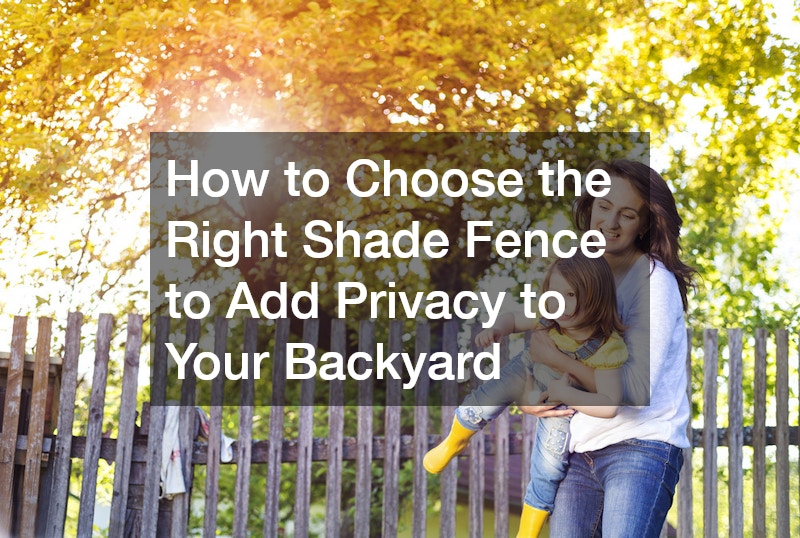Choosing the right shade fence for your property requires careful consideration and planning. A privacy fence does more than just provide privacy; it can also add to the aesthetic appeal of your yard, create shaded areas that are enjoyable to relax in, and even increase your property’s value. This comprehensive guide will walk you through everything you need to know to make an informed decision. By the end, you’ll have a solid understanding of how to assess your needs, choose the right materials, and follow local regulations. Your dream privacy fence is just a few steps away.
Assess Your Privacy Needs

Before you dive into selecting a shade fence, it’s crucial to assess your privacy needs. A landscape designer can help you evaluate your yard’s layout and determine the best options for creating seclusion. Consider the areas where you need more privacy, such as around a pool, patio, or garden.
You might want different types of privacy fences depending on the level of privacy needed in each specific part of your yard. A taller and more solid fence might be suitable for spaces requiring a high degree of seclusion, while a more open, decorative privacy fence could work well in less private areas. Landscape designers can help you strike a balance between privacy and visual appeal, offering creative solutions that meet both functional and aesthetic goals.
Additionally, think about the views you want to block as well as the views you’d like to keep. Consider if you need to shield yourself against noise from nearby streets or maintain the view of a beautiful garden. A well-planned privacy fence can provide privacy from nosy neighbors while allowing you to enjoy the scenic parts of your property. With these considerations in place, you can move on to understanding the different types of privacy fences available and how they meet your specific privacy needs.
Understand Different Types of Privacy Fences
There are many types of privacy fences to choose from when considering a privacy fence. Local landscaping contractors can offer a variety of styles and designs, ranging from traditional wood fences to modern vinyl and composite options. Each type of material has its own advantages and drawbacks, and the right choice depends on your specific needs.
Wood fencing, for example, is a classic choice that offers a natural, warm appearance. Local wood fence companies can provide various styles, from solid panels to decorative lattices, that complement your landscape design. However, wood requires regular maintenance to prevent rot and decay and may not be as durable as other materials.
On the other hand, vinyl and composite fences are low-maintenance options that can mimic the look of wood without the need for constant upkeep. These materials are durable and can stand up to harsh weather conditions, making them a great choice for long-term use. Additionally, they come in a variety of colors and styles, providing more design flexibility. Your local landscaping contractor can help you understand the pros and cons of each material and decide which shade fence is right for you based on factors like budget, aesthetics, and maintenance preferences.
Consider the Material’s Durability
The durability of your shade fence is a major factor in your overall satisfaction with it. Wood fences, while beautiful, require significant maintenance to stay in top condition. Partnering with a reputable wood fencing company can help ensure that your fence is installed properly and maintained regularly to maximize its lifespan.
Different types of wood have varying levels of durability. For example, cedar is naturally resistant to rot and insects, whereas pine may need to be treated to extend its life span. Discuss your options with a wood fencing company to determine the best choice for your climate and intended use, and inquire about additional protective treatments like sealants and stains to further enhance longevity.
Alternative materials, such as vinyl and aluminum, offer superior durability without the maintenance requirements of wood. Vinyl fences are resistant to rot, peeling, and cracking, while aluminum fences are highly resistant to rust and corrosion. Composite materials, which blend wood fibers with plastic, also offer enhanced durability and minimal upkeep. Opting for a durable material can save you money and effort in the long run, making your privacy fence a lasting investment and adding long-term value to your property.
Choose the Right Height for Your Fence

The height of your shade fence plays a crucial role in its effectiveness and aesthetic appeal. A professional landscaping company can help you determine the appropriate height based on your privacy needs and local regulations. Taller fences offer more privacy but may feel imposing, while shorter fences provide some seclusion without blocking views entirely.
For maximum privacy, consider a fence that is at least six feet tall. This height is typically enough to block the view from neighboring properties and create a sense of enclosure in your yard. However, make sure to check with your local landscaping company to comply with any height restrictions in your area.
If you’re looking for a balance between privacy and openness, consider a privacy fence that combines different heights. For example, you could use a taller fence around seating areas and a shorter one around garden beds. Consulting with a landscaping company can help you design a fence that meets all your needs.
Explore Shade Options for Your Fence
A shade fence isn’t just about privacy; it’s also about creating comfortable, shaded areas in your yard. Landscaping services can help you explore various shade options to enhance your outdoor living spaces. Adding climbing plants or installing pergolas can provide additional shade and complement the design of your fence.
Trees and shrubs can also be integrated into your landscape design to create natural shade. By strategically placing these plants near your privacy fence, you can enhance the overall look and feel of your yard while providing much-needed relief from the sun. A professional landscaping service can recommend the best plants for your climate and soil conditions.
Another option is to use shading elements like canopies and awnings. These features can be attached to your privacy fence or installed as standalone structures. They offer adjustable shade and can be moved as needed. Collaborating with a landscaping service can help you choose shading options that are both functional and aesthetically pleasing.
Analyze the Cost of Different Fencing Options
Cost is an important factor when choosing a shade fence. Different materials and styles come with varying price tags, so it’s essential to analyze your budget and compare options. Lawn care services can provide estimates and help you understand the long-term costs associated with each type of fence, including initial installation and future maintenance.
Wood fences, for example, may have a lower initial cost but require ongoing maintenance, which can add up over time. Regular treatments, repairs, and repainting are necessary to maintain a wood fence’s appearance and functionality. Conversely, vinyl and composite fences have a higher upfront cost but are more economical in the long run due to their low maintenance requirements and longer lifespan. Lawn care services can help you weigh these factors and make a cost-effective decision.
Don’t forget to account for installation costs and any additional features you may want, such as decorative elements or integrated lighting. Installation costs can vary based on the complexity of the design and the size of the area to be fenced. Your lawn care service can provide a comprehensive quote that includes all these aspects, such as labor, materials, and any extra features, making it easier for you to budget for your new privacy fence and avoid unexpected expenses.
Check Local Regulations and Permits

Before installing your shade fence, it’s crucial to check local regulations and obtain any necessary permits. Fence supplies and fencing companies can guide you through this process, ensuring that you comply with all relevant laws. Different municipalities have varying rules regarding fence height, materials, and placement.
Some areas have homeowner association (HOA) guidelines that dictate the type of fences allowed in your community. Fencing companies are familiar with these regulations and can help you choose a fence that meets all requirements. Failing to adhere to local regulations can result in fines and may require you to alter or remove your fence.
Additionally, some local regulations may require you to notify your neighbors or obtain their consent before installing a fence. Consult with your fencing company to understand all the requirements and make sure you have all the necessary permits before beginning your project.
Think About Maintenance Requirements
The maintenance requirements of your privacy fence are an essential consideration. Wood fences require regular sealing, staining, and repairs to keep them looking their best. Fencing companies can offer maintenance plans and services to help you keep your fence in top condition. Regular care not only extends the life of your fence but also maintains its aesthetic appeal, preventing issues like rot or warping.
Vinyl and composite fences, on the other hand, are low-maintenance options that require minimal upkeep. A simple cleaning with soap and water is usually enough to keep them looking new. If you prefer a hassle-free option, these materials are an excellent choice for your privacy fence, as they resist fading, cracking, and pests.
Metal fences, such as aluminum or wrought iron, may require occasional painting or rust-prevention treatments to maintain their appearance and structural integrity. Discuss the maintenance needs of each material with your fencing company to choose the option that best fits your lifestyle and budget. Consider your willingness to perform regular upkeep versus investing in a low-maintenance solution. Proper maintenance ensures that your shade fence remains a valuable asset to your property for years to come, enhancing both functionality and visual appeal.
Evaluate the Aesthetic Appeal of Your Fence
A privacy fence should not only serve a functional purpose but also enhance the beauty of your property. Local wood fence companies can offer a variety of styles and finishes to match your home’s architectural design. A well-designed fence can create a cohesive look and add curb appeal to your property.
Consider the color, texture, and overall design of the fence when making your decision. A natural wood finish can create a warm, inviting look, while a sleek, modern vinyl fence can add a contemporary touch. Local wood fence companies can provide samples and mock-ups to help you visualize how different options will look in your yard.
Additionally, think about how your privacy fence will interact with other elements of your landscape, such as plants, pathways, and outdoor furniture. A harmonious design can create a seamless transition between your indoor and outdoor living spaces. Consult with local wood fence companies to create a shade fence that blends beauty and functionality.
Think About Installation and Professional Help

The installation process is a critical factor in the success of your shade fence project. Fence installation can be a complex task that requires expertise and specialized tools. Hiring a professional fence installation service ensures that your fence is installed correctly and securely.
Professionals can handle all aspects of the installation, from digging post holes to securing panels and gates. They can also address any challenges that arise, such as uneven terrain or difficult soil conditions. A professional installation not only guarantees the durability of your privacy fence but also saves you time and effort.
Before hiring a fence installation service, check their credentials and reviews to ensure they have a solid reputation. A reliable company will provide a detailed estimate, including labor, materials, and any additional costs. By choosing professional help, you can enjoy peace of mind knowing that your privacy fence is in good hands.
Choosing the right privacy fence involves careful consideration of various factors, from privacy needs and material durability to cost and maintenance requirements. By working with professionals such as landscape designers, local landscaping contractors, and fencing companies, you can create a privacy fence that meets your needs and enhances your property’s aesthetic appeal. Remember to check local regulations and consider the long-term maintenance of your fence to ensure it remains a valuable addition to your home. Whether you opt for wood, vinyl, or another material, the right shade fence can provide privacy, shade, and beauty for years to come.




